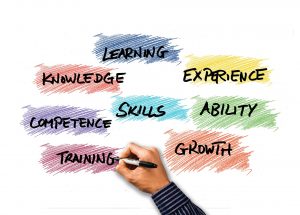 Jas highlighted that a good place to start is looking at the skills employers are likely to want. Here are the most requested skills employers are looking for in graduate job candidates and some things to reflect on in articulating your experiences:
Jas highlighted that a good place to start is looking at the skills employers are likely to want. Here are the most requested skills employers are looking for in graduate job candidates and some things to reflect on in articulating your experiences:
- Drive and resilience
Why did you want to become an Ambassador? What motivated you to want to become an Ambassador? If you are able to articulate your passion for something and share why you are doing what you are doing, it comes across well in an application
- Teamwork
Teamwork is something all employers will ask for, but taking responsibility for your role and contribution is really important. When you worked in a team, what did you contribute? How did you help your teammates? How did you use your skills, knowledge and experience to achieve a goal? Have a go at this teamwork quiz to see your teamwork strengths. Being specific is always better than being vague! They’ll be impressed that you are so reflective and self-aware. This demonstrates other skills that you have and makes you stand out for all the right reasons. Anyone can say, ‘I’m good at communication’ but knowing your communication skills goes a step further.
- Adaptability and flexibility
How have you been able to be flexible and adaptable as an Ambassador? Think about times when you have had to adapt to different audiences or think on your feet. Being able to work under pressure and making calm choices when thinking about the bigger picture is an important skill. Give specific examples from something you’ve done, such as amending the lunch time on an event because a group were late, or adapting a session when the technology failed. Ambassadors are incredible at thinking on their feet, so before an interview, it’s worth coming up with some specific examples of times when things went awry and what you did to respond.
- Organisation
Do you meet deadlines? Can you balance work and studies? Have you organised an event? Led a campus tour? It is helpful to be able to say, I am highly organised, able to perform multiple tasks at the same time during events and activities and able to listen to and follow instructions carefully. Think about whether you have experience in organising people and events and make sure you have some specific examples to demonstrate the role you have played in organising outreach activities.
- Communication
Don’t forget communication is about listening as well as speaking. Being an Ambassador means you have to communicate regularly with the Outreach Office, so think about the skills you have developed communicating with both learners and the team.
- Problem solving
This includes identifying and assessing problems, implementing solutions and evaluating them, dealing with conflict in a team, in your degree, and resolving a complaint. I’m sure we have all had to respond to a problem on a work opportunity. Think step by step about what you did and how you got a problem resolved. What did you learn, and what would you do next time?
- Leadership and decision making
Being a good leader means listening, using your interpersonal skills, making decisions and having the integrity to stand by them, being able to delegate, take responsibility for your team outcomes, and motivating and coaching. An example of something many of you will have done is leading campus tours using interpersonal skills to promote the University with enthusiasm and professionalism answering queries from a diverse range of people. You have all had to negotiate with students to encourage them to complete a task or share an idea! Negotiating and persuading others is a big part of the world of work, and your experience will stand you in good stead for the future. Using empathy skills and emotional intelligence to relate to students and give them the support they need also provide important experiences.
Most universities have abassador schemes, but don’t expect an employer to know exactly what you have done. Make it easy for them to understand the skills you have gained and the experience you can offer. If you are able to talk about your skills in specific ways, with examples and taking responsibility for the part you played in the scheme, you will be a stronger candidate and leave employers in no doubt about what you took from your experience.
The University Careers Team are available to help you to articulate your skills. to review your CV, and to provide training opportunities. To find out more, have a look at their website here.
